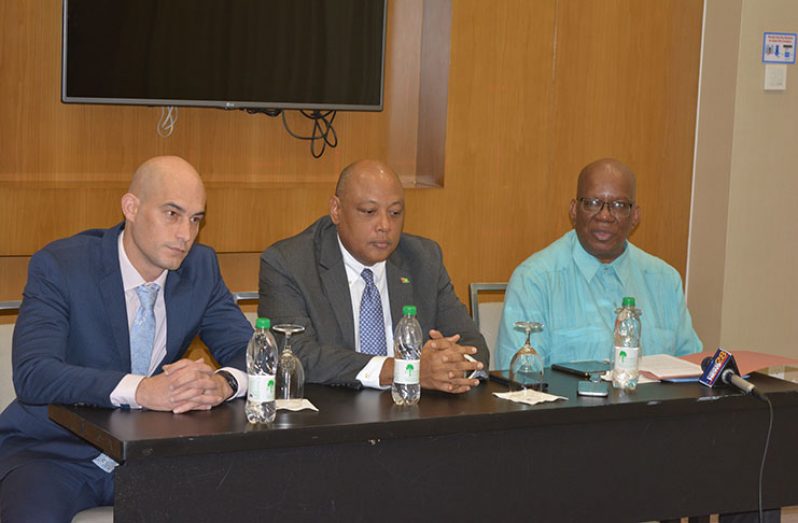— Jordan outlines three-pronged approach for spending of oil money
CABINET has finally given the nod of approval to a three-pronged proposal on how best to utilise the proposed Sovereign Wealth Fund (SWF).
This was disclosed on Thursday by Minister of Finance, Winston Jordan, at the closing of a four-day Workshop for Review of Preliminary Draft of Natural Resource Fund Legislation at the Marriott Hotel.
By definition, a Sovereign Wealth Fund (SWF) is a State-owned investment fund that is made up of surpluses from official foreign currency operations, proceeds of privatisations, governmental transfer payments, fiscal surpluses and or receipts resulting from resource exports.
These monies can be used for investment purposes to benefit the country’s economy and citizens.
In Guyana’s case, the proposed fund is intended to enable the country to obtain long-term benefits from its oil and mineral resources.
Noting that one of the three recommendations is inter-generational in nature, Minister Jordan said: “This will be saved for a rainy day and the future generation.”
The second, he said, is for stabilisation, given the fickle nature of oil prices and the continuous funding of projects in a stable market if oil prices drop.
The third aspect, Jordan said, will be current investments, particularly in infrastructure.
As he explained: “We don’t have much of an infrastructure at the moment; these funds give us ample opportunity to really modernise Guyana, creating a link between our coast and our hinterland, giving us the opportunity to benefit from significant gas resources, so that our products can become competitive for energy, and give us the opportunity to diversify into more value added activities.”
‘OPPORTUNITY TO DIVERSIFY’
In an effort to explain what he meant by ‘opportunity to diversify’, Minister Jordan said:
“Now, instead of selling raw gold, we can think of a smelter and get into other aspects of gold, such as gold bars; gold jewellery.
“We have manganese, and there are a number of other opportunities that we can get into; the heavy industries, once there is a cheap supply of energy.”
By way of a backgrounder, Minister Jordan said the establishment of a SWF has been a subject of discussion since 2015, and that contrary to popular opinion, is not only associated with oil revenues, but pension funds, and mining and agriculture revenues, amongst other uses as well.
A preliminary draft of the proposed legislation, he said, was produced last year by Minister of Natural Resources, Raphael Trotman, and upon review, it was decided that Guyana could benefit from the experience of Uganda’s legislation, since that country is almost at a similar stage as Guyana.
He said that after Minister Trotman fine-tuned the draft, it was then passed on to the Finance Ministry in January 2017 and Guyana’s international partners, among them the International Monetary Fund (IMF), the World Bank, the European Union (EU), the United Kingdom and the United States, for comments.
In terms of where we’re at presently with the legislation, Minister Jordan said:
“So far, we have accelerated the implementation of it; those comments, with the draft, are with Dr. Wilde, who is reviewing and revising it, and we are thankful for his interest and support.”
The official at reference is Dr Daniel Wilde, Economic Adviser at the Oceans and Natural Resources Division of the Commonwealth Secretariat, who it was that proposed how the Guyana model of the SWF should be crafted.
Minister Jordan said an inter-ministerial committee was established to manage the exercise. These partners are from the Ministry of Finance, Natural Resources, the Guyana Revenue Authority, Bank of Guyana, the Fiscal Bureau, amongst others.
He concluded by thanking the participants, while noting that the workshop was a part of the capacity-building exercise.
BUILD FURTHER CAPACITY
Meanwhile, Minister Trotman said that over the next few years, Guyana will dedicate its energies to building even more capacity.
“We are happy that we are putting in place the rules for the governance of the sector; and those rules have to be supported by institutions; one such being the Petroleum Commission, which has received widespread national and international scrutiny and recommendation were made,” he said.
Promising that the Petroleum Commission and the SWF will be in place before the first barrel of oil is poured, Minister Trotman said it’s all thanks to the efforts of the Commonwealth Secretariat as the principal drafter of the legislation.
Dr. Daniel Wilde, in turn, commended the Guyana Government for thinking about setting up the Fund beforehand, unlike other countries which do so long after the oil starts flowing.
“The fact that the Government has had the foresight to look into the long-term and implemented the law, institutions and fiscal laws in place before production, they should be commended,” Dr. Wilde said.
He said the draft legislation is solid, and will go a long way in achieving the aforementioned three main objectives of the SWF.




.png)









